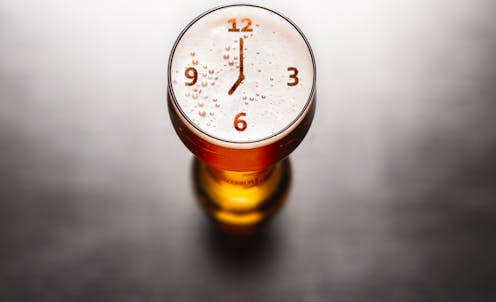How pubs could get drinkers to swallow a peak-time price rise
- Written by Cathrine Jansson-Boyd, Reader in Consumer Psychology, Anglia Ruskin University

You may be used to paying more for a plane ticket or a train journey during peak times. But now a major British hospitality company has announced a similar approach to how much it costs to drink beer.
Stonegate Group, which owns chains including the Slug & Lettuce, has announced[1] plans to increase drinks prices by 20p when their pubs are at their busiest.
At a difficult time for the hospitality industry[2], some might consider this a bit of a gamble. Certainly there has been something of a backlash on social media with, one person commenting[3]: “If they push on with this there will be no such thing as a busy Stonegate pub.”
A spokesman for Stonegate told the Daily Telegraph that they are introducing the measure – known as “dynamic pricing[4]” – to deal with rising staffing costs, and that customers would be kept informed of any fluctuations in price.
The success of dynamic pricing – especially common (but not popular[5]) in travel – relies on whether or not a company or event can guarantee demand from potential customers. If they have other options, or feel that a price is simply too high, they may simply look elsewhere.
That said, research has shown (perhaps surprisingly) that consumers are generally fairly forgiving of price increases[6] if they consider the increase to be fair – perhaps if they know it’s down to increased supply costs for example.
But if a price hike is specifically related to a certain day or time of the day, it is quite possible that customers will perceive the increase as unfair. This could then lead to a negative perception of an establishment, and a loss of business.
Before that change even happens, consumers tend to use[7] their own reference points when making a judgement about what a product ought to cost. These may derive from a menu or advertisement (external reference points) or recalled from memory or personal knowledge about what other people have paid (internal reference points).
For example, customers may know that they generally pay £5 for a pint of beer at a particular pub, and they will use that price as their starting reference for what an acceptable price might be. They are using their reference points to assess price fairness[8]. For a price increase to be perceived as fair, the reference point needs to shift in accordance with the new cost.
This is no simple task for any business. In the case of dynamic pricing in a pub, a potential problem is that the low price used during the less busy periods may become the customers’ reference point. The peak rate price then stands out as unjust.
So how can the problem of reference points be overcome so that the price is not perceived negatively? Research suggests that the way in which alternative pricing is presented is key to how customer respond.
For example, one study showed that golfers tended to think it was fair[9] for a golf club to charge a regular price for “prime time” slots and offer a 20% discount for other times. But they thought it was unfair if the course charged 20% more for a prime slot compared to a regular price at other times.
The response to the two scenarios was different, even though the economic impact was the same. By changing the point of reference, it is possible to change consumers preferences.
Pub landlords seeking to introduce dynamic pricing may get a better response if they try and alter the drinkers’s perception in a similar way. Presenting price changes as being cheaper during off-peak times are likely to be viewed as a gain from the drinkers’ perspective.
When information is presented in a way that make it seem like a gain for the customer, the evaluation is more positive than in a scenario where there is predominantly a sense of loss or increased cost.
Of course, it’s also important not to lie to your customers. But research suggests that adjusting the presentation and framing of new price structure may lead to a change that drinkers are more willing to swallow.
References
- ^ has announced (www.theguardian.com)
- ^ for the hospitality industry (www.theguardian.com)
- ^ commenting (www.bbc.co.uk)
- ^ dynamic pricing (dictionary.cambridge.org)
- ^ not popular (www.independent.co.uk)
- ^ forgiving of price increases (academic.oup.com)
- ^ tend to use (www.albacharia.ma)
- ^ assess price fairness (www.jstor.org)
- ^ think it was fair (link.springer.com)
- ^ Mikael Damkier/Shutterstock (www.shutterstock.com)
Read more https://theconversation.com/how-pubs-could-get-drinkers-to-swallow-a-peak-time-price-rise-213606







